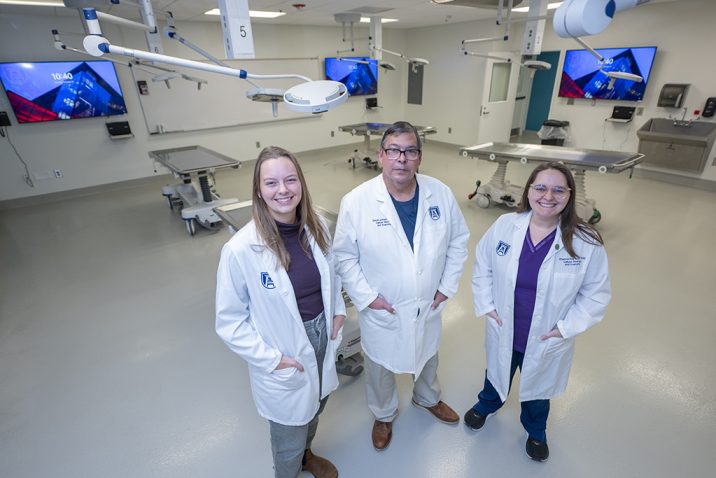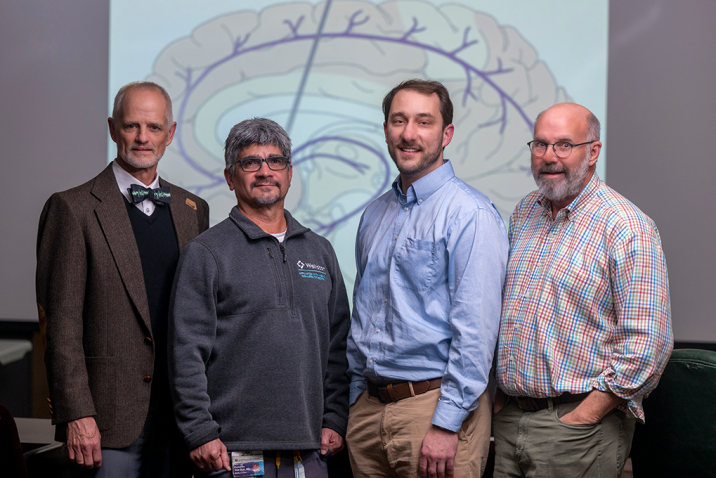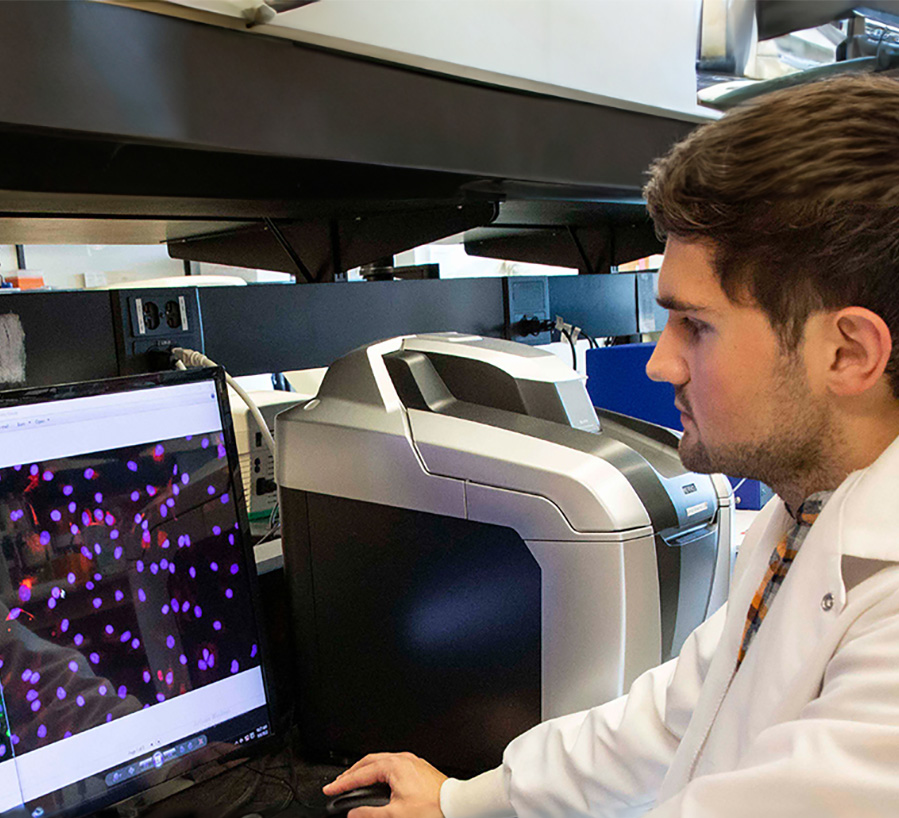Genomic Medicine
With a PhD in Genomic Medicine, you’ll study human diseases, create diagnostic tools, and develop new therapies by mastering high-throughput technologies, in vitro and in vivo models, and patient data.
Graduates will be prepared to compete for biomedical research positions in research universities, medical schools, government agencies, and industry.
By choosing to earn your doctorate in Genomic Medicine from the Medical College of Georgia at Augusta University, you’ll be learning from a diverse group of researchers across the basic science departments and centers.
Genomic Medicine is for you if you consider yourself
Life-Changing
Life-Saving
Education
Want to learn more about the Genomic Medicine program at Augusta University?
Request InfoWhat You'll Study
Coursework
Students in Augusta University’s Doctor of Philosophy in Genomic Medicine are admitted via a common admissions process to the Biomedical Sciences doctoral programs. After completing the first-year core coursework and laboratory rotations, students choose a dissertation research mentor and enter the Genomic Medicine program.
The average time to complete the degree is approximately five years of full-time, year-round study.
Curriculum | Admissions Criteria | Tuition and Fees | Application Deadlines



EXPLORE. EXCEL. EXPAND.
Graduate School Advantage
Augusta University's graduate programs are among the best in the nation – and the world – and our graduate students are our most valuable assets. To ensure that our students earn more than a degree, the Graduate School offers a range of opportunities so they can develop the leadership, communication and personal skills needed for a rewarding life and academic, research or professional career.
See what the Graduate School has to offer »
About the Graduate SchoolExperience-based Education
Outside the Classroom
The university’s Center for Biotechnology and Genomic Medicine houses state-of-the-art equipment for genetics, genomics, proteomics, drug screening and bioinformatics.
The rotation program ensures students are familiar with the techniques, concepts and theories used in the Center for Biotechnology and Genomic Medicine so they can carry these skills forward to their own research endeavors.
With core labs in bioinformatics, proteomics and genomics, students have access to the latest equipment and techniques.
Integrated Approach
The interdisciplinary environment integrates technological and biological disciplines to create a rich environment for scientific exploration.
Varied Research
Faculty research expertise includes genomics, bioinformatics, computational and molecular biology and proteomics.
The Medical College of Georgia
As the state’s only public medical school, MCG is recognized as Georgia’s leading provider of physicians and receives nearly $64 million in funding from the National Institutes of Health.
Diverse Faculty
Genomic Medicine faculty come from across the Medical College of Georgia’s basic science departments and centers, creating an integrative research program.
Your Future
Career Options
According to the U.S. Bureau of Labor Statistics, the median pay for a medical scientist is $100,890 per year.
Job growth is expected to rise much faster than average.
Profiles
Student Stories
I enjoy my Functional Genomics and Proteomics, as well as Computational Methods courses. The former teaches me about techniques that are used in the field of Genomic Medicine and their application. Whereas the second introduces me to the field of Bioinformatics that is used to decode the massive data that the newly advanced machinery generates.
Stepan Budkin
I chose Genomic Medicine at AU because I was always interested in big data analysis and the translational aspect of biomedical research. Our Genomic Medicine program is very translational in nature and graduates have moved on to assume academic and industry careers.
Sai Karthik Kodeboyina
Admissions Criteria at a Glance
GPA: Overall GPA of 3.0 on a 4.0 scale at the Baccalaureate level calculated on all undergraduate work.
Degree Requirement: Minimum of a Bachelor’s degree or equivalent from an accredited college or university.
Transcripts: Official transcripts are required from all universities and colleges ever attended. Unofficial transcripts from US colleges and universities can be used in the admissions review process in lieu of official transcripts for this program.
Standardized Test Requirements: None are required for this program.
Letters of Recommendation: Recommendations from three individuals must be submitted through the application portal.
Resume: Applicants must submit a resume or curriculum vitae within the application portal.
Research Experience: Research experience is required for admission. Within the application, you will be prompted to provide both personal and research statements. Please consult the application for the full statement prompts.
International Students: Please review the verification process for international transcripts and the english proficiency requirement.
Tuition & Fees Estimate
$4,801*
Estimated total
Full-time / In-State / Per Semester
$401
Tuition Per Hour
$675
Mandatory Fees
View Detailed Program Tuition
*Tuition & Fees listed here are for in-state students enrolling in the university for Fall 2025 semester.
Detailed Program Tuition InformationApplication Deadlines
Fall '26 International Deadline**
- December 1, 2025
Fall '26 Deadline
- December 1, 2025 - extended to December 15, 2025
Early submission of all application materials is strongly advised.
All required application materials and documents must be received in order for an application to be considered complete and before an admission decision can be made. The program does not accept applications after the published application deadline, however the program will continue to accept application materials up to 2 weeks after the application deadline.

Why Augusta?
Research facilities with state-of-the-art equipment enable students to pursue their research efficiently and conveniently.
Distinguished faculty with experience in genetics, genomics, biotechnology and translational medicine provide an interdisciplinary research environment that encourages creativity and innovation.
The Medical College of Georgia is also home to the Georgia Cancer Center, the Georgia Prevention Institute, the Vascular Biology Center and the Center for Healthy Aging. With these important centers and institutes on campus, students have opportunities to interact with researchers from a wide range of biomedical fields.

Families leave lasting contribution to medical science with body donations
Families leave lasting contribution to medical science with body donations
MCG starts human trials on deep brain stimulation for Alzheimer’s patients
MCG starts human trials on deep brain stimulation for Alzheimer’s patients

